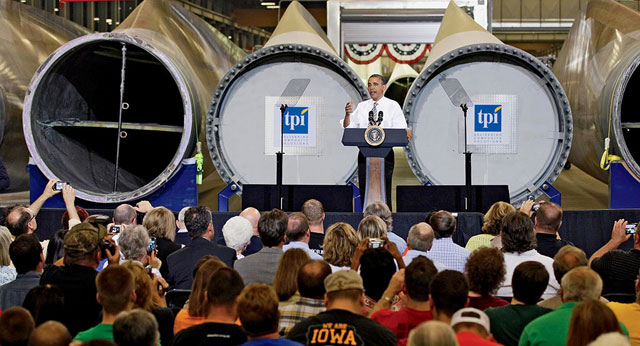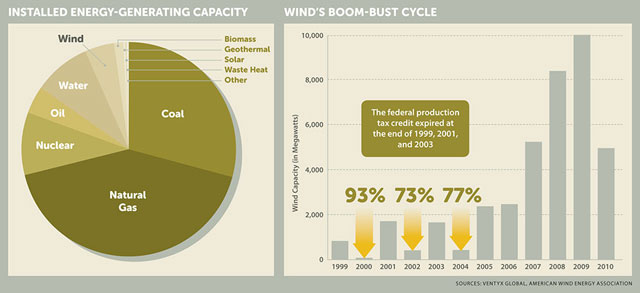sierraclub.org - sierra magazine - march/april 2013 - wind rush: wind's close call
 President Obama speaks about wind energy | AP Photo/Charlie Neibergall
President Obama speaks about wind energy | AP Photo/Charlie Neibergall
As 2012 drew to a close, congressional Republicans were spurning bipartisan appeals from wind states and refusing to extend federal incentives for wind power, which were set to expire at the end of the year. Only in January's emergency "fiscal cliff" legislation was the renewable-energy production tax credit extended for a single year, giving wind developers a 2.2-cent tax cut for 10 years for every kilowatt-hour of power produced.
But by then the damage had been done. The months of uncertainty had spooked investors, leading to thousands of layoffs, factory slow-downs and closures, and a grinding halt in new wind farm projects. Consequently, the boom year of 2012, which saw an estimated 12 gigawatts come online—more new capacity than from any other energy source in the country—will be followed by a much slower wind year in 2013, as it will take six to nine months just to rehire, retool, and renew construction permits, according to the American Wind Energy Association.
The push by congressional Republicans to kill the tax credit was backed by a nationwide anti-wind campaign—rife with discredited health, environmental, and economic claims—from an array of opposition groups, notably ones supported by billionaire oilmen Charles and David Koch. The goal was to make wind politically "toxic," according to the Koch brothers-linked American Energy Alliance. Their main argument: Wind is too costly and should compete on a "level playing field" rather than survive on "handouts."
Harold Prior of the Iowa Wind Energy Association calls this an "anti-wind mythology that stands truth on its head," saying that a fair look at all energy subsidies reveals a playing field heavily tilted toward fossil fuels. Wind energy is cheap once on the grid, he says, but the up-front investment is steep—which is why a tax incentive was first passed under President George H.W. Bush. For nearly a century, the fossil fuel sector has received similar incentives for oil and gas exploration, which also requires costly up-front investment. But oil and gas subsidies are permanent, while wind has to sing for its supper every few years before Congress, which has let the incentive lapse several times. This continuing uncertainty holds wind investment back, Prior says.

When the Washington, D.C.–based Environmental Law Institute analyzed federal energy subsidies between 2002 and 2008, it found that $70.2 billion went to fossil fuels, $16.8 billion to corn ethanol, and $12.2 billion to all renewables combined. The balance shifted somewhat in 2009 and 2010 with the Obama administration's green stimulus spending. But even then fossil fuels still came out on top, receiving about $50 billion over two years compared with $13.2 billion for corn and $20 billion for all renewables. The wind production tax credit accounted for $1.2 billion a year.
Had the credit expired, some 37,000 wind jobs—about half the national total—would have been at risk. Those jobs are now safe (for the time being), but even with the extension of the tax credit, it will take two to three quarters to gear up again because of the long lead time for manufacturing turbine components, says Joe Baker, CEO of the new turbine plant built in Iowa by Spanish energy firm Acciona.
One bright spot for wind advocates: Instead of requiring wind farm construction to be completed before the end of 2013 to earn the tax credit, the new extension mandates only that projects begin construction during the year. Completion can come as late as mid-2015, which means the one-year reprieve for wind investors is more like a two-and-a-half-year extension. "So 2014 is going to be big," a jubilant Prior predicts. Like others in the wind business, he says the industry could wean itself from tax credits entirely in five to six years—though he argues that fossil fuel subsidies should be ended as well. "Now that's a level playing field I'd like to see."
It's not surprising, observes wind energy pioneer James Walker, that opposition to wind power is so intense. "The ferocity is evidence that wind is becoming competitive," he says. "Think about it: We're mass-producing a type of power plant that burns nothing, uses no water, needs no fuel, has no emissions. That's a pretty scary thing to someone in the fossil fuel business." —Edward Humes
NEXT: Conflict Avoidance